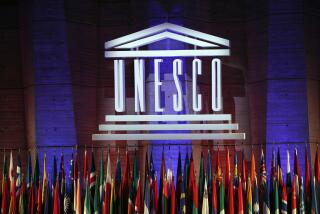It’s Time to Rejoin UNESCO
The Bush Administration and Congress are moving with glacial speed on the question of resuming membership in the United Nations Educational, Scientific and Cultural Organization, UNESCO, which ignores the opportunity to accelerate reforms within the organization.
Part of the problem may be financial. Some worry that the annual share of some $50 million would break a budget already so tight it is playing havoc with important basic programs. That is the worst of all reasons. If the United States cannot afford participation in international organizations, who can?
And part of the problem is a conviction of Secretary of State James A. Baker III and some leaders in Congress that UNESCO has not yet corrected adequately the problems that led the United States to leave at the end of 1984. That argument perpetuates the strategy followed in recent years, inspired by Sen. Nancy Kassebaum (R-Kan.), and assumes that Washington can get its way in a world organization only by withholding funds, even if the withholding violates treaty obligations. That policy has now been relaxed for the United Nations itself, but not before serious damage was done to the vitality of the organization because of the withdrawal of U.S. assessments and contributions. A more appropriate course is to join the diplomatic competition and win by playing by the rules and by persuasion--not blackmail.
A new day has dawned at UNESCO. The new director general, Federico Mayor Zaragoza of Spain, elected in November of 1987, has circulated a draft plan for the organization’s next six years that refocuses the organization on its original priorities. He is moving to reform the secretariat, so badly damaged and politicized by his predecessor, Amadou Mahtar M’Bow of Senegal.
While the United States stalls, the Soviet Union has shown new interest in a reformed UNESCO. Last October, Foreign Minister Eduard Shevardnadze, in the first appearance of a Soviet minister at a UNESCO meeting, endorsed the reforms demanded by the United States and apologized, in effect, for the past failure of the Soviet Union to ratify the UNESCO convention on the protection of the world’s cultural and natural heritage.
Much remains to be done. So much, according to Secretary of State Baker, that it would be premature to rejoin now. There is disagreement on that, as was demonstrated in recent hearings before Sen. Daniel P. Moynihan (D-N.Y.). Baker appears determined to await the outcome of the UNESCO executive board vote in May on the plan for 1990-95 and the vote of the full membership in November before reevaluating the situation. Obviously, he prefers trying to influence the course of UNESCO for this important period from the outside, more confident apparently in this indirect diplomacy using threats of a continued boycott as opposed to engaging directly and openly in the debate.
There always will be an excuse to remain outside. The very structure of an international organization, reflecting the imperfections of the member states and the world itself, means that it can never attain the standards now demanded by the United States in fiscal probity, de-politicization and staff professionalism. Those problems are not unique to international organizations, however. And to cling now to demands for perfection is to miss the prospect of speeding important reforms. The United States can provide exceptional leadership in literacy, mass education, basic science, technology and the protection of the world’s cultural diversity, the UNESCO basic programs.
Director General Mayor is committed to the goals that Americans share. The most effective way to support those goals is within the organization, with full U.S. participation.
More to Read
Sign up for Essential California
The most important California stories and recommendations in your inbox every morning.
You may occasionally receive promotional content from the Los Angeles Times.










